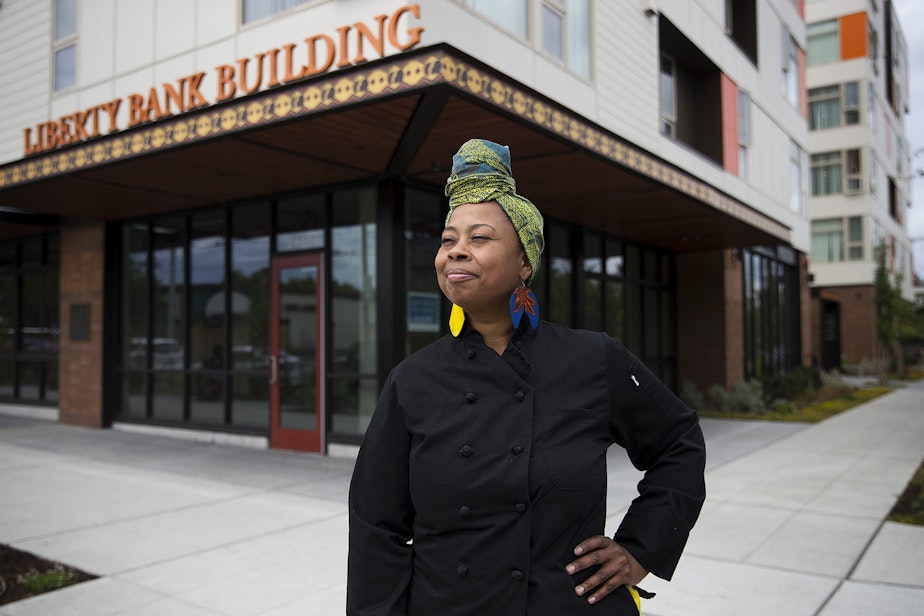'Where the millionaire can sit with the homie' and have a good time. Chef Kristi Brown's welcoming space

New development has displaced many from the Central District, Seattle’s historically Black neighborhood. But slowly, former residents and businesses are taking charge of shaping the Central District’s future.
One of them is Kristi Brown, chef and owner of catering company That Brown Girl Cooks.
Kristi Brown plans to open a restaurant this spring on 23rd and East Union Street, a joint venture with her son Damon Bomar. The place is still under construction, but she’s beaming as we walk through the space.
“It’s exciting … for me,” Brown said. “I wanted a place where the cooks could have fun and enjoy the scenery as well instead of being in the back.”
The seating is still being configured, but Bomar who will be the bar manager, says one thing is certain.
“We’ll have a large communion table," he said. "A long table where a lot of people can sit.”
The name of restaurant will be Communion.
Sponsored
“People are like, you sure you want to go that route?” Brown said. “That seems awfully religious.”
If you Google the word "communion" you'll find that it means "the sharing or exchange of intimate thoughts and feelings, especially when the exchange is on a mental or spiritual level."
“I think that what I know is that our food and experience that people have with us reaches them on levels that normal food doesn’t. It is a religious experience; it’s going to be like where you’re religiously going to be wanting to come!”
Brown’s much anticipated restaurant is a bittersweet homecoming. In a neighborhood that used to be more than 70% African American, today’s Central District looks nothing like their old community.
“I literally grew up two blocks from where this restaurant is going to be and we feel it,” Bomar said. “We feel the difference, the shift in Seattle. And so I think we’re missing a sense of closeness, familiarity and intimacy with the city in general.”
Sponsored
The restaurant is not going to bring the numbers back. But mother and son want to create a space where everyone feels welcome.
“This represents Seattle, like a dynamic Seattle," Brown said. "This represents a lot of the energies and cultures that we see here and it brings it together and we can come to this space and say I’m home.”
“I’ve said this over and over again…" she adds. "I want a place where the millionaire can sit with the homie and everybody have a good time.”
Before gentrification, neighborhood restaurants were woven throughout the Central District’s fabric.
Longtime resident Steve Sneed and former director of the Langston Hughes Performing Arts Center remembers them: Thompson’s Point of View; Ms. Helen’s Café; Catfish Corner; Sammy’s Burger. These were not just neighborhood restaurants, Sneed said. They were part of a network of places that made the Central District feel like a community.
Sponsored
“What’s crazy is that we didn’t know at the time that we were really forced to live in that neighborhood.”
Back then, Seattle had a redlining policy that discriminated against non-whites. Families like Sneed’s were barred from buying homes in certain neighborhoods. Their options were limited to the south—the International District and the Central Area.
“That’s where our parents bought homes … but we made a community out of that.”
Sneed says growing up, his neighbors were Jewish, Japanese Americans and other minorities who were not welcomed elsewhere in the city. He shakes his head at the irony of it. Today the average home in the Central District is more than $800,000. Most of the residents are white. But the neighborhood’s DNA is Black. Sneed says having businesses like Communion helps tell the story of Central District’s resilience.
“That’s what the vision is, that people of all races would come to Kristi’s restaurant,” he said. “They will come to eat good food and maybe they’ll learn more about African American history in that experience.”
Sponsored
And the food? The food at Communion will be what Brown calls "Seattle Soul." Rest assured there will be fried food, greens and other Southern staples. But the menu will also reflect the neighborhood’s cultural evolution over the years.
“There’s so many things that I love and want to explore and so the catering didn’t really allow me to do that so now I get to do it. I get to burn. I’m excited.”




